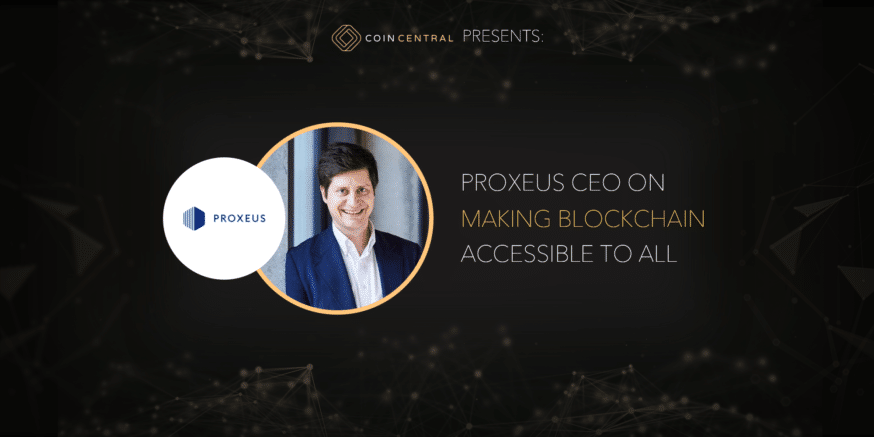Proxeus CEO Antoine Verdon on Making Blockchain Accessible to All
Antoine Verdon is the Co-Founder and CEO of Proxeus, a company working to make blockchain compatible with traditional companies and existing enterprise infrastructure. Founded in 2015, Proxeus aims to be “WordPress for the blockchain,” making it easy for organizations of all sizes to run their businesses on the blockchain.
The Proxeus team has already demonstrated some very impressive results with their three-layer technology model–from speeding up the registration process for new businesses to enabling the University of Basel to use blockchain to issue academic credentials secure from fraud.
As a serial entrepreneur and fintech pioneer, Antoine was named among the 100 top Swiss personalities by magazines L’Hebdo and Bilan (2010 and 2013). He founded Legal Technology Switzerland to work on delivering more accessible legal services through digital channels. He’s also a strategic advisor to Swiss banks on fintech topics.
There are many theoretical use cases for blockchain, but in the following interview, we find out how the technology is being applied already–and how it can be rolled out to all businesses.
Your background is in law and you’re well-known for your passionate stance on politics. So, how did you get into the blockchain space?
I actually never practiced law. During my last year of law school, I co-founded Sandbox, a global network of young entrepreneurs. Later, I moved into venture capital and was leading a fintech fund based in Zurich. In 2012, we started looking at blockchain as a technology that could profoundly disrupt banking. Later, we invested into a US bitcoin exchange and I observed the Ethereum ICO with great interest–that was the point when I understood that blockchain wouldn’t just change banking, but redefine the work processes and business models of every single industry.
What is Proxeus all about and what problem are you trying to solve? How does the XES token work?
Our goal is to make blockchain technology more accessible. We want to make it possible for anyone to create their blockchain applications without requiring specific technical knowledge. The XES token connects our users in a decentralized ecosystem, without the need for us to stand in the middle of every transaction.
You dub yourselves as “WordPress for the blockchain,” – what do you mean by this?
20 years ago, every website had to be coded in HTML manually. WordPress has changed that by allowing anyone to program a website structure in just a few clicks. We are doing the same for blockchain applications: in just a few hours, you can create the skeleton of a blockchain application for your project or company.
Proxeus claims to be blockchain agnostic, how are you able to manage this and why is this important?
In the blockchain development stack, we are positioning ourselves as a middleware, that can connect to any blockchain. When you send out an email with Outlook you do not know if the protocol used is smtp or pop3. The same will be true with blockchains in the future.
Can you tell us about your three-layer technology model? Who is Proxeus for? Who are the types of people that will interact with your product?
Similarly to WordPress, we have a core platform, completed by a series of modules, which combined with a font end allow the creation of decentralized applications. Anyone interested to prototype and eventually build a blockchain application will be able to use Proxeus to create the framework.
Why is it important to allow outside developers to create DApps?
DApps represent a new way to build applications. In a traditional setup, developers must manage big and complex applications with multiple permission layers. In a DApp setup, everyone has their own small DApp, connected by the blockchain. The development and administration costs can be considerably reduced.
In your whitepaper, you liken the crypto-space to when businesses had to adjust to computers in the 70s, internet in the 90s, cloud in the 2000s, and mobile in 2010s. Is this really the next big change?
Blockchain will bring a whole new wave of efficiency and trust. It will transform traditional business models in the same way as Internet has transformed commerce and communication.
How can businesses embrace blockchain faster, especially small-to-medium businesses with lower budgets? What will happen to businesses slow to adapt?
Small business may not be able to implement blockchain-based processes immediately, but those that started their learning curve early will have a clear advantage, and the laggards will eventually disappear. The goal of Proxeus is to provide a sandbox where everyone can come and test how their business can be run in a blockchain context.
How long do you think it will take before we see mass adoption of blockchain tech and what are the barriers to that happening?
We expect first live applications to be started this year, but it will take another 3-5 years before blockchain tech is adopted by the masses.
You recently demoed your product with some amazing results, helping the University of Basel to become the first in Switzerland to use blockchain to issue course certificates and secure academic credentials from fraud. Can you tell us how you did that?
We programmed the course certificate digitally so that the responsible person can enter data and have the document created automatically. The document is hashed and the hashed is registered on the blockchain, allowing future employers to verify the authenticity of the diplomas they receive using a simple drag and drop interface.
What are the impacts of this on higher education?
It will simplify the interaction between employers and universities at first, but it will also create a broader ecosystem of trust around academic credentials – I wouldn’t be surprised if, at some point in Linkedin, you could connect your crypto-identity in order to display “verified diplomas” on your profile.
It will also considerably reduce the administration work for Universities. In the end, isn’t a masters degree the result of a sum of conditions that could be programmed into a smart contract?
You also used Proxeus technology to legally register a company, from start to finish, in under 3 hours (instead of the 4 – 6 weeks it normally takes) at the DigitalSwitzerland challenge. How was this possible?
Currently, in Switzerland, it takes about 10 days to create a company. This is due to the fact that the actors (entrepreneur, lawyer, bank, notary, company register) work in a sequence. With a smart contract on the Hyperledger blockchain, we could change that and register a company legally from start to finish in just 1 hour 37 minutes.
What other main use cases do you see Proxeus being applied to?
Every business will be able to automatize their processes and connect them to smart contracts to move to the next stage of digitization.
Where did Proxeus get its name?
Proxeus is the Greek god of proxies, building a bridge between the traditional and the blockchain worlds.
What’s a typical day like for you? Do you have any free time at all?
I usually take some time to read in the morning, and whenever I can, I cook in the evenings. But those times, unfortunately, get rarer as we are now into the execution phase of the project – evenings and weekends are busy and I have a heavy travel schedule ahead.
Not a lot of people know this, but you were a saber champion in Switzerland, do you still get to practice at all?
Unfortunately, I didn’t get to practice lately! I live close to the lake in Zurich where I go jogging and sometimes swimming.
You call yourself a serial entrepreneur. So, what are the next steps for Proxeus and the next steps for Antoine?
For now, I am all-in on the current projects – Proxeus and blockchain more generally will still occupy me for a few years!
Thank you!
[thrive_leads id=’5219′]
Never Miss Another Opportunity! Get hand selected news & info from our Crypto Experts so you can make educated, informed decisions that directly affect your crypto profits. Subscribe to CoinCentral free newsletter now.










